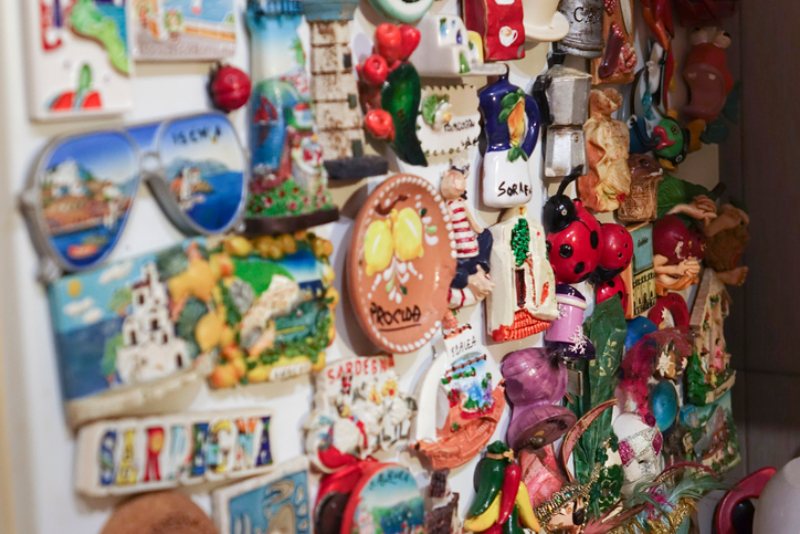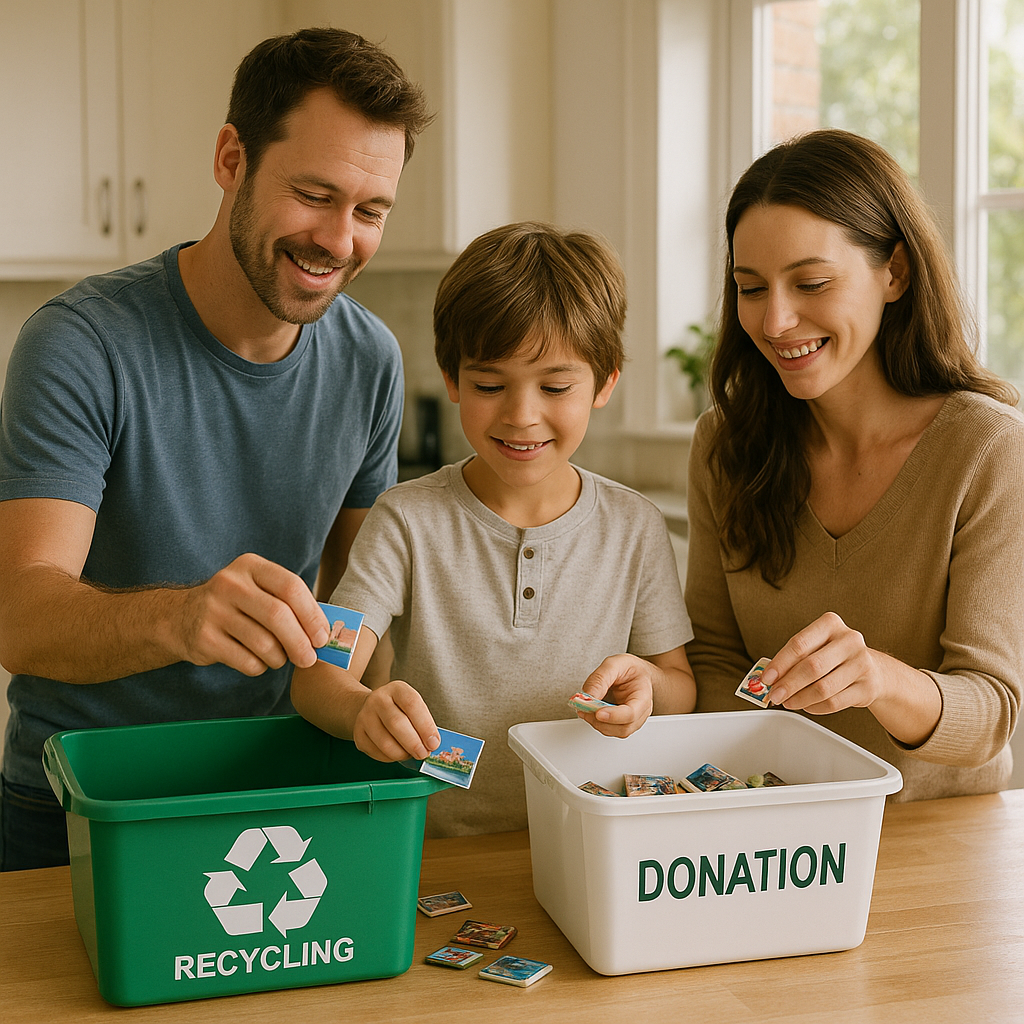5901 Botham Jean Blvd, Dallas, TX 75215
How to Dispose of Fridge Magnets: Recycling Tips, Safety Steps & Reuse Ideas
September 2, 2025Did you know that millions of fridge magnets end up in landfills each year? These small household items create an outsized environmental problem. Their complex composition makes them particularly difficult to process through standard recycling systems.
Fridge magnets typically contain a mixture of materials that don’t break down naturally. The common decorative magnets found in most homes combine plastic casings, metal components, and sometimes rare earth elements. This multi-material construction prevents biodegradation and complicates recycling efforts.
The environmental burden grows with each discarded magnet. While a single magnet might seem inconsequential, their cumulative impact becomes significant. Improper disposal allows potentially harmful materials to leach into soil and water systems, creating long-term ecological concerns that extend far beyond their small size.
How Can You Properly Dispose of Fridge Magnets?

Fridge magnets are common household items that often accumulate over time. When it’s time to discard them, proper disposal methods help minimize environmental impact. Unlike stronger neodymium magnets, standard refrigerator magnets don’t require specialized disposal services.
For household fridge magnets, start by wrapping them in multiple layers of paper or plastic. This simple step prevents them from attracting other metal items in your waste. It also helps protect other items from potential damage during the waste collection process.
After wrapping, place the magnets in a sturdy container before adding them to your regular household waste. Small metal containers work particularly well for this purpose. These containers provide an extra barrier that keeps the magnets from interacting with other metal objects in the waste stream.
Step-by-Step Disposal Process
- Wrap thoroughly – Use several layers of paper or plastic wrap to fully cover each magnet
- Use a container – Place wrapped magnets in a small metal container or sturdy box
- Seal securely – Make sure the container is properly closed to prevent magnets from escaping
- Add to regular waste – Dispose of the sealed container with your household trash
Small kitchen magnets can be handled the same way. The key is isolation – keeping them from attracting to other metallic items during waste collection and processing. This prevents potential equipment jams or disruptions at waste management facilities.
Alternative Options Before Disposal
Before disposing of fridge magnets, consider whether they might still have useful life. Many schools and daycare centers welcome magnet donations for classroom projects. You could also repurpose them for home organization or craft projects.
For creative reuse, try removing the original images and attaching new ones. You can make custom magnetic pictures or labels for your kitchen organization. Flexible sheet magnets can even be cut into different shapes for various uses around the home.
If your collection includes stronger magnets, additional precautions are necessary. These should be placed in containers lined with iron or steel sheets to contain their magnetic field. This prevents them from sticking to other ferrous metals in landfills.
Remember that fridge magnets cannot be placed in standard recycling bins. While the materials they contain may be valuable, current recycling systems aren’t designed to process them. When mixed with recyclables, they can actually disrupt sorting equipment and contaminate otherwise recyclable materials.
What Are the Options for Recycling Fridge Magnets?
Most household fridge magnets cannot be traditionally recycled through curbside programs due to their mixed material composition. However, this doesn’t mean they must end up in landfills. Several specialized options exist for responsible disposal and recycling of different types of magnets.
Conventional Fridge Magnets
Standard decorative fridge magnets typically contain a mix of materials including plastics, ceramics, and small amounts of ferrite. While these cannot be processed through standard recycling streams, consider these alternatives:
- Repurpose them as organizational tools for paperclips or small metal items in home offices
- Donate intact magnets to schools, daycare centers, or community organizations
- Upcycle them into creative projects such as magnetic tangrams, photo displays, or bag closures
If disposal is necessary, these conventional magnets should go into general waste as they cannot be processed through standard recycling facilities.
Rare Earth Magnets
Neodymium-iron-boron (NIB) magnets found in electronics like hard drives, speakers, and some higher-end refrigerator door seals contain valuable rare earth elements that warrant specialized recycling:
Several innovative recycling methods have been developed for these valuable magnets:
- Hydrogen Processing of Magnetic Scrap (HPMS) – This environmentally friendly process breaks down NIB magnets into powder that can be directly used to manufacture new magnets without extensive chemical processing
- Acid-Free Solutions – New techniques use copper salts instead of hazardous acids to extract rare earth elements from discarded magnets with up to 98% recovery rates
- Direct Recycling – Some companies demagnetize, clean, and mill discarded magnets into powder for new magnet production, reducing energy use by approximately 90% compared to traditional manufacturing
Where to Recycle Magnetic Materials
If you have electronics containing rare earth magnets that need recycling:
- Contact electronics retailers with take-back programs that specifically mention magnet or rare earth element recovery
- Search for specialized e-waste recyclers that advertise rare earth element recovery capabilities
- Inquire with local hazardous waste collection facilities about proper disposal options
- Check manufacturer websites for mail-back recycling programs for their products
For businesses with larger quantities of magnetic materials, specialized recycling services like Okon Recycling offer direct recycling methods for end-of-life magnets, which involve demagnetizing, dismantling, and preparing materials for reuse.
The Environmental Impact
Recycling rare earth magnets is particularly important from an environmental perspective. The mining and processing of rare earth elements is energy-intensive and often involves environmentally harmful chemicals. Studies show that recycling these materials through methods like HPMS can reduce carbon emissions by more than 50% compared to primary production.
While recycling options for everyday fridge magnets remain limited, the technology for recovering valuable rare earth elements from electronic magnets continues to advance, making this an increasingly viable part of sustainable waste management.
How Can You Repurpose Old Fridge Magnets?

Fridge magnets tend to accumulate over time. Promotional magnets from local businesses, souvenir magnets from travels, and those random decorative pieces can quickly overtake your refrigerator. Instead of tossing them in the trash, give them new life through creative repurposing.
Transform Promotional Magnets
Those advertising magnets don’t have to remain eyesores. Sand the surface lightly to create texture, apply a coat of primer, then finish with chalk paint for a clean slate. This simple makeover lets you customize the magnets with your own designs or patterns.
Another option is to cover promotional magnets with fabric, decorative paper, or family photos. A thin layer of mod podge or clear-drying craft glue will secure your new design while preserving the magnetic functionality.
For business settings, repurpose old magnets as temporary signage. Print updated information on regular paper and attach it to existing magnets for easy-to-swap messaging that doesn’t generate additional waste.
Create Functional Household Items
Old magnets can solve everyday organizational challenges. Attach them to the back of small notebooks for magnetic shopping lists that stay put on your refrigerator. Place a magnet under your work area when doing home repairs to catch falling screws and metal shavings.
Make cord wranglers by gluing small magnets along the edge of your desk to keep charging cables from falling to the floor. Cut flexible sheet magnets into puzzle pieces and attach decorative paper or photos to create interactive fridge puzzles for children.
For a practical kitchen application, transform old magnets into spice storage. Attach small magnets to the bottoms of lightweight spice containers and mount them on a metal surface for a space-saving solution that keeps ingredients within reach.
DIY Decorative Projects
Channel your creativity into decorative magnet projects. Paint and personalize old magnets to create an ever-changing mural on a large metal board. Cut fun shapes from cardboard, decorate them, then attach them to existing magnets for custom fridge art.
For a simple weekend project, turn magnets into picture frames. Glue flexible magnets to the back of thin frames so you can easily move your photos from one metal surface to another without damaging walls or furniture.
Gift tags gain extra utility when backed with magnets. After a gift is opened, the tag becomes a decorative keepsake for the recipient’s refrigerator instead of being discarded.
[[artifact_table]] Creative Magnet Repurposing Ideas by Difficulty Level [[/artifact_table]]Educational Applications
Schools and educational settings benefit greatly from repurposed magnets. Create alphabet sets by attaching letters to old magnets for literacy activities. Design magnetic math manipulatives by gluing numbers and symbols to magnets for interactive lessons.
Make a magnetic fishing game by turning magnets into bait on homemade fishing rods. “Catch” paper fish cutouts with small metal paperclips attached for an engaging children’s activity that teaches hand-eye coordination.
Draw a maze on paper, tape it to a metal cookie sheet, and guide a small metal object through the maze using a magnet underneath. This simple science demonstration shows children how magnetic fields work through surfaces.
Donate for Community Use
If crafting isn’t your passion, consider donating your old magnets to organizations that can put them to good use. Schools, daycare centers, senior centers, and community art programs often welcome magnet donations for their projects.
Before donating, clean the magnets thoroughly and remove any questionable advertising content. Group similar magnets together to make the donation more useful for classroom sorting activities and creative projects.
Local maker spaces may also accept magnet donations for community workshops focused on sustainability and creative reuse. Your unwanted magnets can become valuable resources for educators and community groups while keeping these items out of landfills.
Conclusion: Responsible Management of Fridge Magnet Waste

Proper disposal and recycling of fridge magnets are not just minor details in household waste management. These small items contain valuable materials that, when managed correctly, can help conserve resources and reduce environmental impact. Even simple refrigerator magnets contain materials like iron oxide and strontium carbonate that require significant energy to extract and process. By taking appropriate steps to handle these items at the end of their useful life, we contribute to reducing the demand for new raw materials and minimize harmful waste.
The best practices we’ve explored—from proper separation and containment to seeking specialized recycling services—all work toward the common goal of environmental stewardship. Strong magnets require particular attention due to their potential environmental hazards if improperly discarded. The creative reuse options we’ve discussed not only extend the life of these products but also help reduce the overall waste stream. Remember, responsible magnet waste management is part of a larger commitment to sustainable living. For assistance with proper disposal of magnets or other recyclable materials, contact Okon Recycling at 214-717-4083.
